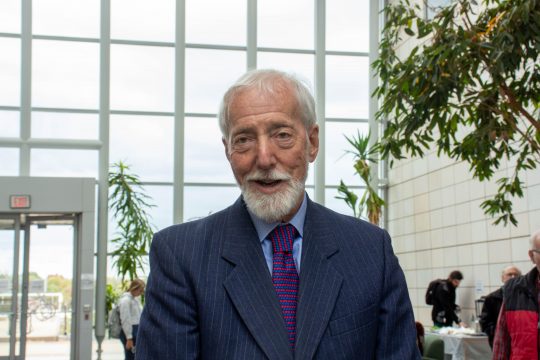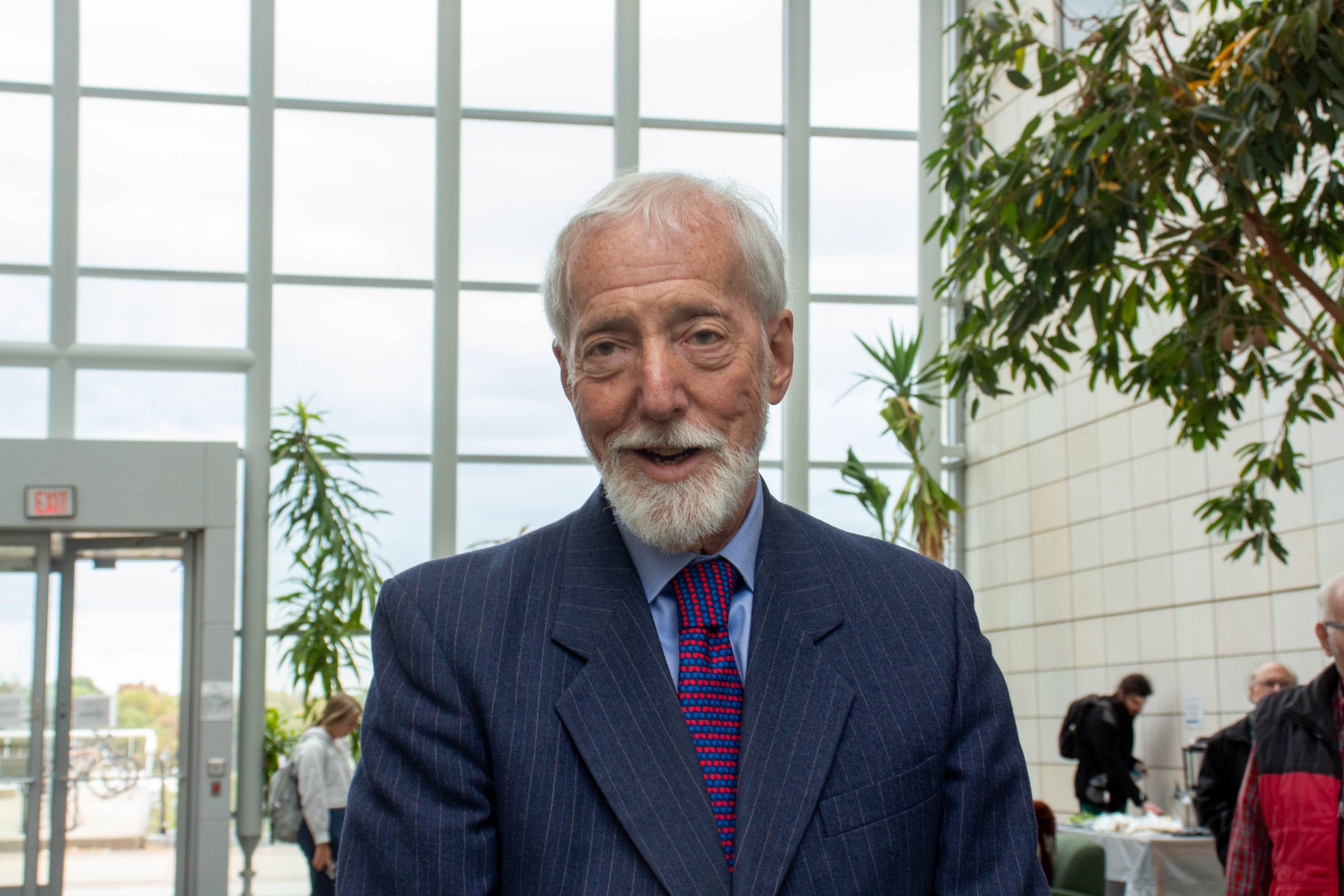Predicting the outcome of a conflict with stakes such as those of the war in Ukraine is a difficult feat. Yet that is just what retired senior U.S. diplomat and former Lawrence University Scarff Professor Jon Greenwald attempted to do in his Tuesday, Oct. 10 lecture, “The War in Europe – the U.S. stake in Ukraine’s success.” Although this is the first Povolny Lecture of the 2023-2024 academic year, the lecture was not his first; in 2004, he gave another speech titled “Prospects of Peace in the Middle East.” At 4:30 p.m. the lecture began; Lawrentians and members of the public packed in to hear Greenwald’s knowledge from over half a century of work in international diplomacy.
Greenwald began by briefly recounting the circumstances leading up to the invasion. He told this history through Putin’s presidency beginning at his 1999 appointment, through his unsuccessful and unrecognized small-scale invasion of Ukraine in 2014, to his 2021 article revealing his neo-Stalinist vision for Russian-Ukranian unity until the February 2022 all-out invasion.
Greenwald was in Jerusalem preparing to return to the States when he received news of the invasion. He remembered clearly the overwhelming Western response it triggered – “Western” in this context meaning countries in the European Union (EU) and/or North Atlantic Treaty Organization (NATO) — believing that Ukraine was outmatched and would fall in a matter of days. However, to the West’s surprise, this mass prediction did not come true; almost two years later, Ukraine was still fighting for its sovereignty. As of late 2022, when the West was still contributing great means to Ukraine, the conflict even leaned in the defensive country’s favor. Ukraine’s future was looking brighter.
However, as this contribution waned with time into the present, Russia has made a violent resurgence, evening the odds of the conflict.
“[Russia] learned some of the lessons they needed to learn, including to respect…that Ukraine was a serious enemy,” Greenwald said. “The bottom line is, it’s going to be a tough winter…it’s going to be a long war.”

Greenwald reported that the two countries are currently locked in a bloody stalemate. He said support for Ukraine is fraying across the West. Pro-Ukraine Slovakia recently elected a pro-Russian party into office and Poland, which has enthusiastically supported the Ukranian effort, is quarreling with Ukraine over trade. Still, Greenwald said that, apart from these small setbacks, the European consensus to back Ukraine is still incredibly strong.
Greenwald’s concerns surround the vital U.S. involvement in Western support for Ukraine. President Joe Biden’s most recent prospective aid package passed with bipartisan support in the Senate, but is facing trouble in the House of Representatives. House Republicans are attempting to strip the aid package in return for keeping the government open in the face of shutdown earlier this month. Even then, that’s only if the House unfreezes; having recently lost its Speaker, the House is unable to pass any legislation in this interim before a new Speaker is sworn in.
As the largest entity in NATO, the U.S. rescinding its great contributions – money, weaponry, intelligence and beyond – would be a great loss to the Ukrainian effort. Greenwald is unconfident that the European West will be able to – or will choose to – continue supporting the cause. If not for Ukraine’s sake, Greenwald asks us to consider the problems that pulling out would pose domestically; he suspects it would shake the trust Western allies place in us, amplify our conflicts in the Middle East and Asia and destroy American self-confidence as the “land of the free and home of the brave.”
Greenwald had begun the lecture quoting physicist Niels Bohr: “Making predictions is always difficult.” Depending on the U.S.’s decisions, the war could have dramatically different end results, and therefore the current situation steeps its long-term future in uncertainty. Due to his prediction that neither country will overwhelm the other, Greenwald suspects the conflict will ultimately end in a ceasefire or armistice. However, this sort of resolution is rarely fair; he said they are most often leveraged on the side of the victor. For Ukraine, victory could mean reclaiming lost territory. With that said, even in this best-case scenario, Greenwald predicts they will not be able to easily hold Putin accountable for his war crimes due to his uncooperative, strongarmed nature. On the off chance the Russian president faces justice or is removed from power upon defeat, the potential rise of an equally ambitious successive regime is far from impossible.
All things considered, Greenwald took a moment to acknowledge how successful Ukraine has been over the course of the war. He ended his speech with a call to the West, especially America, to keep promoting Ukrainian affairs, such as bolstering their economy to help draw displaced countrymen home.
“If Ukraine can retain its spirit…and we can keep our word…then there’s a solid prospect that there will be a democratic, prosperous, surviving Ukraine.”

